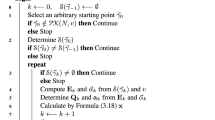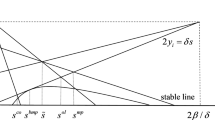Abstract
This paper deals with continuous-time zero-sum two-person Markov games with denumerable state space, general (Borel) action spaces and possibly unbounded transition and reward/cost rates. We analyze the bias optimality and the weakly overtaking optimality criteria. An example shows that, in contrast to control (or one-player) problems, these criteria are not equivalent for games.
Similar content being viewed by others
Author information
Authors and Affiliations
Corresponding author
Additional information
The research of this author was supported by a grant from the Spanish Secretaría de Estado de Educación y Universidades in cooperation with the European Social Funds.
The research of this author was partially supported by CONACyT Grant 37355-E.
Manuscript received: February 2004/Final version received: July 2004
Rights and permissions
About this article
Cite this article
Prieto-Rumeau, T., Hernández-Lerma, O. Bias and overtaking equilibria for zero-sum continuous-time Markov games. Math Meth Oper Res 61, 437–454 (2005). https://doi.org/10.1007/s001860400392
Issue Date:
DOI: https://doi.org/10.1007/s001860400392




